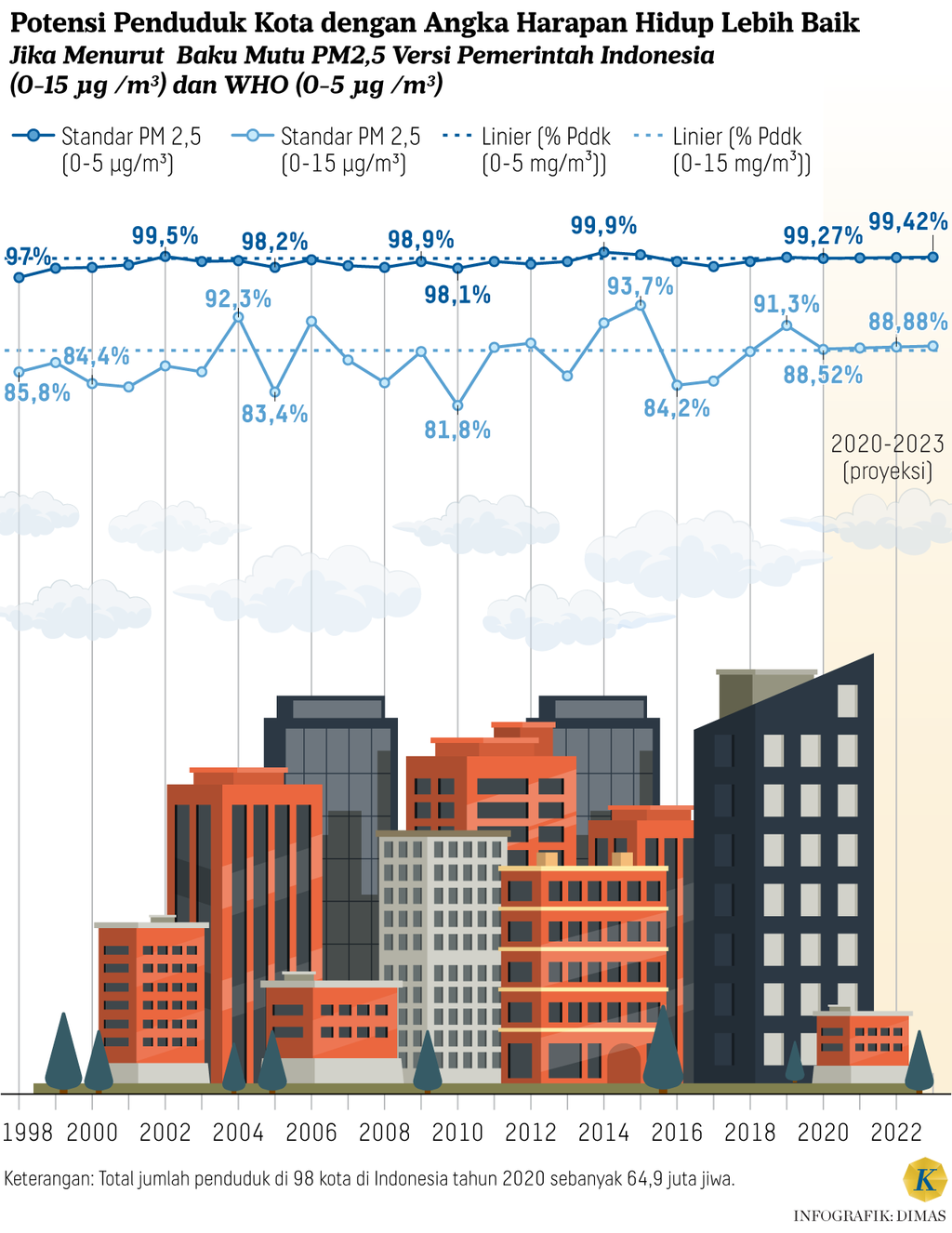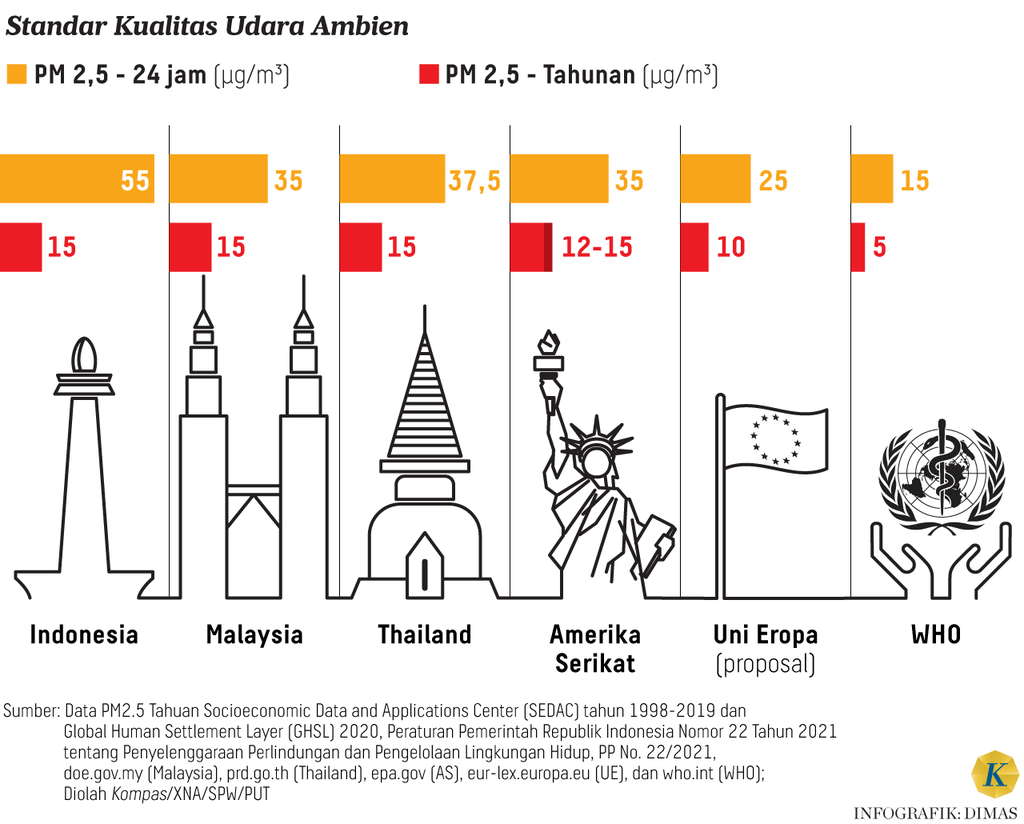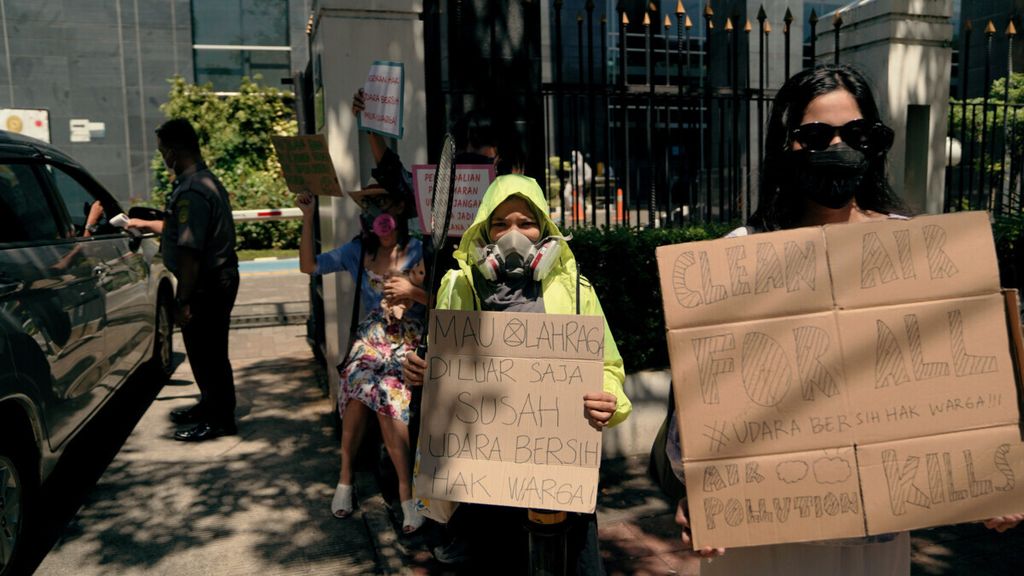Tighten Air Quality Standards for the sake of Citizens
Guidelines for ambient air quality standards for PM 2.5 pollutants in Indonesia under WHO. Tightening allows residents to enjoy healthier air.
This article has been translated using AI. See Original .
The following article was translated using both Microsoft Azure Open AI and Google Translation AI. The original article can be found in Perketat Baku Mutu Udara demi Warga
/https%3A%2F%2Fasset.kgnewsroom.com%2Fphoto%2Fpre%2F2023%2F09%2F03%2Fcbe6b99e-d409-4428-b133-1638f5306cad_jpg.jpg)
Pollution haze covers the sky over Jakarta, which is currently hosting the 43rd ASEAN Summit on Sunday (3/9/2023).
The World Health Organization's stricter annual PM 2.5 pollutant threshold could save more citizens in various cities in Indonesia. If the WHO guidelines are implemented, 99.4 percent of city residents in Indonesia or 64.5 million people will have a longer life expectancy.
If using the annual PM 2.5 threshold set by the government, only 91.3 percent of urban residents in Indonesia or 60.1 million people have a longer life expectancy.
Life expectancy is the average estimation of how many years a person can live from birth. Life expectancy is also used as an evaluation tool for the government's performance in improving the welfare of its citizens.
Regarding the annual PM 2.5 quality standard, Indonesia uses a maximum limit of 15 µg per m3 (micrograms per cubic meter) in accordance with Republic of Indonesia Government Regulation Number 22 of 2021 concerning Implementation of Environmental Protection and Management. Far above the WHO air quality standard guidelines, namely 5 µg per m3.
/https%3A%2F%2Fasset.kgnewsroom.com%2Fphoto%2Fpre%2F2021%2F11%2F24%2F5e55cb8f-0a6a-40a1-87f5-e4e54473e4c2_jpg.jpg)
Illustration: Masks are worn, among other things, to reduce the discomfort caused by the odor pollution.
This loss of life expectancy refers to the Energy Policy Institute from the University of Chicago, USA. Every increase in PM 2.5 of 10 µg/m3 above the quality standard in an area is believed to cause a reduction in life expectancy of 0.98 years.
Kompas combines multi-temporal PM 2.5 satellite data from the Socioeconomic Data and Applications Center (SEDAC) for 1998-2020 and population data from the Global Human Settlement Layer (GHSL) for 2020 to determine the average loss of hope. live in 98 cities in Indonesia.
The results of Kompas's analysis show that the average reduction in life expectancy in each city varies. The highest was in Depok City, West Java, with an average reduction in life expectancy of up to 6.6 years. This means that the average annual PM 2.5 pollutant condition in Depok City is more than six times the Indonesian version of the annual PM 2.5 quality standard.
If the annual standard of PM 2.5 air quality is tightened in accordance with WHO guidelines, Depok residents can live longer, up to 7.6 years.
As for Sabang City, Aceh, the life expectancy of the majority of its residents is not reduced because they breathe air within healthy limits with PM 2.5 levels between 5-15 µg/m3. If WHO quality standard guidelines are followed, the lives of Sabang City residents could be one year longer.
Also read: Indonesian City Residents Live with Air Pollution

WHO guidelines
The WHO guideline for annual PM 2.5 pollutants of 5 µg/m3 is also actually a tightening from the previous level of 10 µg/m3. The new guidelines were established on 22 September 2021, updating the 2005 WHO guidelines, which at the time were the world's first global air quality guidelines.
The updated air quality guidelines are based on a number of scientific evidence from developed countries with cleaner air. It turns out that the negative effects on health have already emerged at levels of air pollution that are much lower than previously thought. Please note that there are no forbidden words in this article for translation.
According to WHO analysis, if the level of air pollution in the world can be adjusted according to the new guidelines, 80 percent of deaths caused by PM 2.5 can be prevented.

Also read: Nightmare When the Sky is No Longer Blue
The latest WHO tightening of ambient quality standards should be implemented in Indonesia. Moreover, the judge at the Central Jakarta District Court won the citizen's lawsuit (citizen lawsuit) according to the decision of the Central Jakarta District Court Number 374/Pdt.G/LH/2019/PN Jkt.Pst.
One of the court's decisions was to sentence Defendant I, the President of the Republic of Indonesia, and Defendant V, the Governor of Jakarta, to tighten the National Ambient Air Quality Standards, which are sufficient to protect human health, the environment, and the ecosystem, including sensitive populations' health. Please note: no forbidden words were used in this article.
Referring to the report of the Minister of Environment and Forestry at a Cabinet Limited Meeting to address air pollution in Jabodetabek, the government has followed up on the court's decision to tighten national ambient air quality standards by issuing Government Regulation No. 22 of 2021.

Climate Pause Movement activists staged a peaceful action before the start of the reading of the verdict for the air pollution lawsuit at the Central Jakarta District Court on Thursday (16/9/2021).
The Ministry of Environment and Forestry (KLHK) argues that Indonesia has reached the interim target or temporary target of the WHO.
There are four interim targets set by WHO, namely Interim Target 1 or IT-1 of 35 μg/m3 per year, IT-2 (25 μg/m3), IT-3 (15 μg/m3), and IT-4 (10 μg/m3). As for daily or 24 hours, IT-1 is set at 75 μg/m3, IT-2 (50 μg/m3), IT-3 (37.5 μg /m3), and IT-4 (25 g/m3).
The ambient air quality standard in Indonesia is now similar to IT-3 for annual and IT-2 for daily.
Until now, it is possible that there is no country that is the same as WHO in its annual regulation of ambient air quality standards of 5 μg/m3. "The Australian standard, for example, is 8 μg/m3," said the Director General of Pollution and Environmental Damage Control at the Ministry of Environment and Forestry, Sigit Reliantoro, when met at his office in Jakarta, Monday (19/9/2023).
/https%3A%2F%2Fasset.kgnewsroom.com%2Fphoto%2Fpre%2F2023%2F08%2F21%2F2ab7fbbd-e268-496e-8ebc-f1cc653339a2_jpg.jpg)
together with his team, conducted an inspection on the production process of a company suspected of causing environmental pollution. The company, which produces plastic packaging, is located in Cikarang, West Java. During the inspection, the team found several violations of environmental regulations, including the disposal of hazardous waste and the lack of proper waste management facilities. The company could face fines and sanctions for these violations. Reliantoro emphasized the importance of companies complying with environmental regulations to prevent further damage to the environment. He also urged the public to report any suspected cases of environmental pollution to the authorities. The KLHK will continue to conduct inspections on companies suspected of causing environmental damage to ensure that they comply with environmental regulations and prevent further harm to the environment.
More ambitious
Professor of Environmental Engineering at Bandung Institute of Technology, Puji Lestari, said that the presence of several instruments such as ambient quality standards and ISPU (Air Pollution Standard Index) are heading in the right direction.
However, according to him, these efforts could be more ambitious. "This is so that government policy interventions can be felt on a larger scale," said Puji.
/https%3A%2F%2Fasset.kgnewsroom.com%2Fphoto%2Fpre%2F2023%2F09%2F11%2F730bab0e-e924-49e4-8559-d3a9e66219cb_jpg.jpg)
Professor Puji Lestari, an environmental engineering professor at Bandung Institute of Technology, was interviewed by Kompas at her residence in Bandung on Friday (11/8/2023).
Air pollution researcher and guest lecturer at the Faculty of Public Health at the University of Indonesia, Esrom Hamonangan Panjaitan, believes that the annual standard threshold limit and daily air pollution standards in Indonesia are still too lax. He hopes that if Indonesia's air quality standards align with WHO guidelines, the government's efforts should also reflect an improvement in those standards.
Chairman of the YLBHI Management Committee, Muhammad Isnur, added that although the ambient air quality standard in Indonesia under PP No. 22/2021 is better than PP No. 41/1999, the regulation is still not enough to protect people's health. "Almost all parameters exceed WHO's 2005 and latest 2021 guidelines," said Isnur, who is also a legal representative for complaints on clean air.
Also read: Improve Air Quality Standards According to WHO Standards